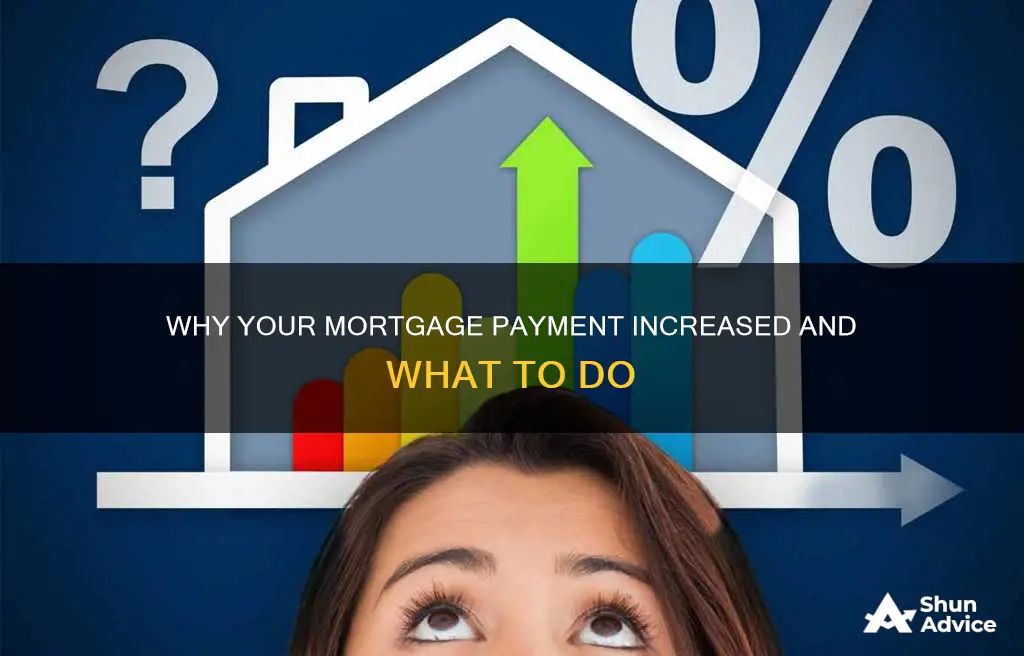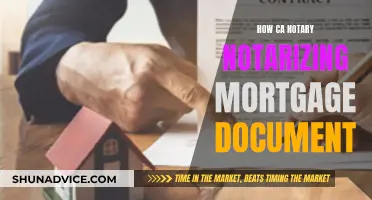
There are several reasons why your mortgage payments might have increased. One of the most common reasons is a change in property taxes or homeowners insurance, which are typically held in an escrow account connected with your mortgage payments. If there is a shortage in your escrow account, your lender might increase your monthly payments to cover the shortfall and ensure future bills are covered. Another reason could be that you have an adjustable-rate mortgage (ARM), where the interest rate changes periodically based on market rates and the loan term. Other reasons include changes in your private mortgage insurance, new servicing fees added by your lender, or a temporary buydown period ending. To understand the specific reason for the increase in your mortgage payments, it is advisable to review your mortgage statements, contact your loan officer, and seek clarification from your lender.
| Characteristics | Values |
|---|---|
| Type of mortgage | Adjustable-rate mortgage (ARM) or fixed-rate mortgage |
| Escrow account | Yes or No |
| Homeowner's insurance | Yes or No |
| Property taxes | Yes or No |
| Interest-only or pay-option loan | Yes or No |
| Private mortgage insurance | Yes or No |
| New fees | Yes or No |
| Property value reassessment | Yes or No |
| Property tax exemptions | Yes or No |
What You'll Learn

Private mortgage insurance
PMI protects the lender if the buyer stops making loan payments, as it is riskier for a lender to provide a mortgage with a low down payment. It's important to note that PMI is not permanent and can be removed from your monthly payments once you have built up enough equity in your home or when the balance of the mortgage drops to 78% of the home's purchase price, whichever comes first. You have the right to request PMI cancellation from your lender once you meet these requirements.
The impact of PMI on your monthly mortgage cost can vary depending on your financial situation. PMI may be more affordable for those with high credit scores, but it can become expensive for those with low credit scores. Additionally, PMI may result in a higher interest rate on your loan. Therefore, it's crucial to carefully consider the pros and cons of PMI before deciding whether to include it in your mortgage.
If you have private mortgage insurance, changes to the PMI amount can cause your monthly mortgage payments to increase. It's important to monitor your mortgage statements and investigate any changes to understand how your payments may be affected.
Gateway Mortgage: A Giant in the Industry
You may want to see also

Escrow account shortage
An escrow account is a financial tool used to pay property taxes and homeowners' insurance premiums. Typically, a portion of your monthly mortgage payment goes into this account. If your monthly mortgage payment includes the amount you pay into your escrow account, then your mortgage payment will also increase if your taxes or insurance premiums increase.
Escrow shortages occur when there are not enough funds in the account to pay property taxes and insurance. This usually happens when the cost of these items increases. For example, your initial tax assessment may only consider the land value of your home. However, once the property is reassessed, it will include the value of your home, increasing your property taxes and, consequently, your escrow payment.
Your mortgage lender is responsible for estimating your annual taxes and insurance premiums and conducting an escrow analysis once a year. However, if the estimated amounts are too low, an escrow shortage will occur. In this case, you will likely have to make an escrow shortage payment. You can choose to pay the full shortage amount upfront or spread the payments over a 12-month period.
To prepare for potential changes in your escrow account, you can stay informed about trends in insurance and property taxes, shop around for the best insurance rates, and set aside money as a backup plan.
Mortgage Business: A Giant Industry Overview
You may want to see also

Adjustable-rate mortgage
An adjustable-rate mortgage (ARM) is a home loan with a variable interest rate. This means that the interest rate on the loan can go up or down depending on market conditions and the performance of a specific benchmark or index. The London Interbank Offered Rate (LIBOR) was the typical index used in ARMs until October 2020, when it was replaced by the Secured Overnight Financing Rate (SOFR) to increase long-term liquidity.
ARMs have two periods: the fixed period and the adjusted period. During the fixed period, the interest rate remains the same, usually for the first 3, 5, 7, or 10 years of the loan. This is known as the intro or teaser rate. After the fixed period ends, the loan enters the adjusted period, where the interest rate can fluctuate based on market conditions and the underlying benchmark. The interest rate changes are typically made at yearly or monthly intervals.
The initial borrowing costs of an ARM are usually lower than those of a fixed-rate mortgage. However, there is a risk of higher interest rates during the adjusted period. ARMs generally have caps that limit how much the interest rate and payments can increase annually or over the lifetime of the loan. This provides some protection from significant interest rate swings.
When considering an ARM, it is important to understand the potential risks and benefits. ARMs may be a good option for homebuyers who plan to keep the loan for a limited period, expect an increase in future earnings, or find the prevailing interest rates for fixed-rate mortgages too high. Additionally, with an ARM, you can benefit from falling interest rates, but you also run the risk of rates increasing.
Mortgage Lenders: A Close Look at Their Practices
You may want to see also

Property tax increases
Firstly, property taxes can increase due to a reassessment of property values. This can be done periodically, or it may be tied to an index in the intervening time between reassessments. If property values have increased in your area, as evidenced by recent nearby home sales, your property tax bill is likely to increase as a result. This increase in property value can be due to home improvements, which can lead to higher taxes.
Secondly, property taxes can also increase due to changes in government policies. For example, if a school district wants to implement a technology upgrade, and voters approve the proposal, this additional cost will be added to your property taxes. This is referred to as a "millage", as it is calculated per thousand dollars of home value. Changes in government policies can also directly affect how your property value is assessed or taxed.
Thirdly, the loss of property tax exemptions can lead to an increase in your property tax bill. These exemptions can vary from year to year, and they are based on an owner's qualifications. For example, certain exemptions may be available for disabled individuals or veterans. If you no longer qualify for an exemption, your property taxes may increase.
Finally, property taxes can increase due to escrow accounts. If you have an escrow account, your property taxes are paid through equal monthly increments. If there is a tax increase that causes a shortfall in your account, your lender will cover the difference until the next escrow review. Following this review, your monthly payment will increase to cover the shortfall, and your lender will increase the tax estimate to ensure sufficient future coverage.
Monthly Mortgage: How Much Should You Be Spending?
You may want to see also

Homeowners insurance increases
Homeowners insurance is usually coupled with your monthly mortgage payment. Therefore, an increase in insurance costs will lead to a higher monthly mortgage payment. There are several reasons why your homeowners insurance may have increased.
Firstly, if you have made any claims on your insurance, your rates may increase. The size of the claim will determine the extent of the increase, with larger claims, such as those resulting from a fire, leading to a greater increase in your premium.
Secondly, your insurance company might raise rates due to inflation, as well as costly or more frequent claims. Inflation will increase the cost of maintenance and remodelling, which will be reflected in your insurance premium. In addition, the increasing frequency and severity of extreme weather events, often linked to climate change, will result in bigger payouts by insurers, causing higher premiums for their customers.
Thirdly, if your property has increased in value, your insurance rates will likely go up. For example, if you have added a new room or deck, boosting your home's worth, your insurance premium will increase.
Finally, you may have lost certain property tax exemptions, which will increase your tax rate and, consequently, your insurance costs.
The Mortgage Market: A Giant in the Industry
You may want to see also







